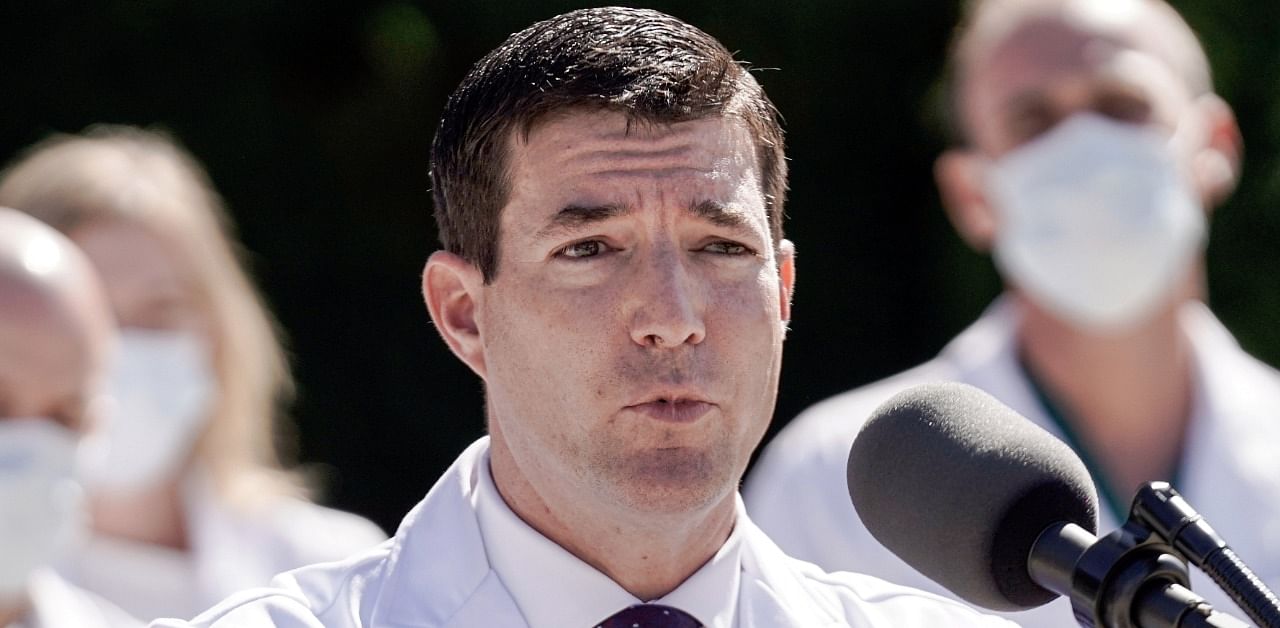
As President Donald Trump remains hospitalised at Walter Reed National Military Medical Center after testing positive for the coronavirus, one doctor is at the centre of his treatment: Sean Conley, the White House physician.
Stepping out of the hospital with a team of doctors behind him Saturday, Conley gave an optimistic update on Trump’s condition at a news conference. He said the President was “doing very well” and in “exceptionally good spirits” after spending Friday night at the hospital.
The news conference put a national spotlight on Conley, who offered a distinctly different outlook from what Mark Meadows, the White House chief of staff, told reporters later.
Here’s what we know about Conley.
He became the President’s physician two years ago
Conley took on the role of White House physician in 2018 after Dr Ronny Jackson was nominated to be secretary of the Department of Veterans Affairs. Jackson withdrew his name from consideration for that post amid accusations of inappropriate workplace behaviour and was subsequently promoted by Trump to the position of assistant to the President and chief White House medical adviser. He is now running for a House seat in Texas.
In March 2018, Conley was named acting White House physician, and he was officially appointed to the position by Trump in May 2018.
He specialises in osteopathic medicine
Conley graduated from the Philadelphia College of Osteopathic Medicine in 2006, according to records from the Virginia Board of Medicine. Doctors of osteopathic medicine tend to emphasize community medicine and preventive care, take a more holistic approach to medicine and rely heavily on physical diagnosis compared with traditional doctors of medicine.
Conley, who received his Bachelor of Science degree from the University of Notre Dame, has served as an emergency doctor for the US Navy since 2006.
A native of Pennsylvania, Conley completed his residency at the Naval Medical Center in Portsmouth, Virginia, in 2013. After his residency, Conley served as chief of trauma for the NATO Role 3 Multinational Medical Unit in Afghanistan.
He served as director of the medical center’s Combat Trauma Research Group for a little over two years.
He supported Trump’s taking hydroxychloroquine
In May, Conley gained attention after revealing that Trump had started taking hydroxychloroquine, an anti-malaria drug, while under his care.
Many experts have questioned the drug’s effectiveness in treating, preventing or curing Covid-19 despite claims from Trump.
The Food and Drug Administration warned in April that it should be used only in clinical trials or in hospitals. The agency also said the drug could cause dangerous heart rhythm problems.
In a letter in May discussing Trump’s use of hydroxychloroquine, Conley said he and the President had “concluded the potential benefit from treatment outweighed the relative risks.”
At the news conference Saturday, Conley told reporters that Trump was not taking hydroxychloroquine.
“We discussed it,” Conley said. “He asked about it. He’s not on it now.”